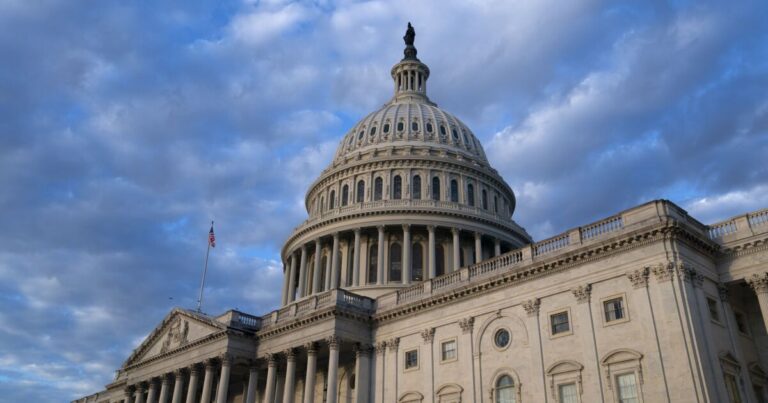Senate Republicans are aiming to wipe away some $3.8 trillion of federal budget red ink from the GOP’s signature tax-and-spending bill with an unprecedented parliamentary maneuver, stoking concerns about long-term U.S. fiscal policy.
Republicans are using a fast-track legislative process known as reconciliation, which will allow them to make President Donald Trump’s 2017 income-tax cuts permanent without Democratic support. The cost of such legislation has long been measured by comparing it to what would otherwise happen to the federal budget under the current law.
Senate Republicans want to start with a different assumption: that the current policy remains in place indefinitely. In that case, extending the 2017 tax cuts beyond 2025 wouldn’t add anything to federal deficits — because they’re simply maintaining the status quo. The Joint Committee on Taxation tallied a $3.8 trillion hit to deficits from keeping the 2017 rates in place another decade.
If successful, the maneuver would upend decades of precedent by sweeping away rules aimed at making it harder for legislators to do permanent damage to fiscal balances. Economists warn it would set a dangerous precedent for future legislation, by allowing the majority party to enact what appears to be a temporary measure and then later setting it in stone without an official cost.
“It immediately undercuts a lot of the benefit of reconciliation from the perspective of folks who are worried about deficit-finance changes,” said Garrett Watson, director of policy analysis at the Tax Foundation, a policy think tank. “That’s why there are those limitations that are currently put in place.”
Borrowing burden
Watson said making the 2017 tax cuts permanent would slightly increase long-run economic growth, but that would not offset the cost and “doesn’t come close to solving the debt problem.” A preliminary analysis from the Tax Foundation found the Senate bill would cost $3.9 trillion over a decade, after accounting for economic impacts.
The latest estimate from the nonpartisan Congressional Budget Office showed the House-passed version of the bill would add, in total, $2.8 trillion to deficits over a decade.
The Senate is seeking to pass its version this week, though the date may slip. The Joint Committee on Taxation scored that chamber’s tax portion of the bill as adding $441 billion to deficits over a decade if using the GOP assumption that extending the 2017 reductions is costless.
Even leaving current deficits in place, the U.S. is already heading for a record debt-to-gross domestic product ratio in coming years. A parliamentary shift that reduces the legislative barrier to increased borrowing threatens to worsen the trajectory, and erode investor confidence in longer-term U.S. Treasuries.
“The key principle in budget accounting is all costs need to be counted at some point,” said Brendan Duke, senior director for federal fiscal policy at the Center on Budget and Policy Priorities, a left-leaning think tank. The move would “ensure that the cost of the tax cuts for 2026, 2027, 2028, 2029 and so on never gets counted.”
The Senate official with the job of deciding what’s allowed in the reconciliation bill, Parliamentarian Elizabeth MacDonough, hasn’t yet made clear whether the “current policy baseline” is in line with budget rules. But she previously said it could be used in the budget-resolution outline that passed the Senate earlier this year.
‘Spending problem’
Republicans argue that taxes aren’t the cause of U.S. deficits, which amount to a “spending problem.” The GOP chair of the tax-writing Senate Finance Committee, Mike Crapo, said in a June 22 statement, “Extending the Trump tax cuts prevents a $4 trillion tax increase — this is not a change in current tax policy or tax revenue.”
There are still provisions in underlying reconciliation legislation — such as a ban against raising deficits after 10 years — that Democrats argue require the use of a “current law” baseline. The Senate tax cuts are likely to violate that rule, analysts say.
The Senate draft includes much of the House-passed provisions, with a few changes. The Senate version makes permanent three business tax breaks, pares back breaks for workers and includes deeper cuts to Medicaid. The cap for federal deductions for state and local taxes is also expected to be pared back from the $40,000 limit set in the House bill.
The move could set a precedent to reap additional tax-cut benefits in the future. The Senate bill limits tax breaks on tipped wages and overtime pay to four years in order to keep down the bill’s price tag. Under a current policy baseline, Congress could extend those levy reductions indefinitely for no cost in the future.
Marc Goldwein, senior policy director at the Committee for a Responsible Federal Budget, a centrist fiscal watchdog group, raised concerns about handing Congress a way to easily enact tax cuts without reckoning with the true cost.
“All of a sudden, the door is open to a lot of other very expensive policies,” Goldwein said. While Republicans might feel good for now as they push the bill, “they haven’t fully thought about what’s going to happen when the shoe’s on the other foot” and Democrats are in the majority, he said.


